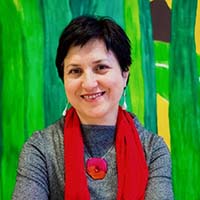Sepideh Yousefzadeh: Teaching in times of COVID-19

Since the COVID-19 outbreak immense level of informative and educational materials have been available through media, academic sources or newspapers, all around the world and in different languages. Those sources contribute to our understanding of the disease and its impacts on the socioeconomic and political aspects of our lives. They provide evidences, perspectives and projections about the course of the disease. While some of them stick to epidemiologic or demographic aspects of COVID-19, others shed light on societal life beyond health and discuss education, poverty, inequality, or impacts of the virus on low income households. Disparities in opportunities for schooling, and online education in particular, are being touched upon in relation to the outbreak in different countries. In that context, access to Internet or web-enabled equipment has been referred to as crucial factors that affect disparities in online education. The limited reports so far indicate that access to education between the poor and the rich is increasing in the United States. Interestingly however, the disadvantaged children in China experienced a more equal access to education during the outbreak. Reportedly, the quality of the online education in private and public schools were rather more equal.
On 11 March 2020 the World Health Organization declared the outbreak a pandemic and precautious measures have been elevated since then around the world, to contain the disease as much as possible. One important measure has been closing down all schools and universities and shifting to online education.
For those of us who are engaged in education sector, the shift to online teaching has been challenging, requiring us revising our approaches to teaching and exams. New skills are to be learnt, new platforms are to be used, learning outcomes for courses are to be revisited, and teaching approaches are to be updated. All this, has to happen in a very short period of time, and many of us shifted to online classes over night with few (or no) previous experiences. It appears that, we need to dive deeper into online education and distance teaching, now that the prospect of holding physical classes is extended at least until summer 2020. This means yet more adaptation to accommodate all students, specifically international students in different time zones. They may have different levels of access to fast Internet (or Internet at all), or their web-enabled devices might not be compatible with the online teaching.
Yet, hurdles in arranging online education and exams are beyond time zones and access to Internet. Providing equitable online education, means being conscious about all forms of diversities among students, locals and internationals alike. For example, some students (as well as educators) might be the only caregivers in their household and may not be as flexible in arranging their time for online education. Some may have household members who live with disabilities, cancer or rare diseases. Thus, the stress and anxiety about the outbreak in those households is by far higher than the rest of us. Some may be struggling with depression or other forms of mental health issues, and uncertainties in this period could trigger or exacerbate their conditions. Some of the international students may not even be able to go back to their home countries because of financial reasons, or simply because the borders shut down before they were able to depart. They are isolated and do not have the chance to be around their loved ones.
Thus, shifting to online education is not happening in a vacuum and is not only about changing the tools and platforms (as challenging as they might be). It means continuing with the task of learning in a diverse setting, where many of those differences are not known or obvious to us. Now that China’s situation is improving, we could be more confident that there is light at the end of this tunnel. Thus, hope is there after all, and we need to join forces and help each other out, to pass through this period as safe and supported as possible. One key component in this journey in my view would be identifying, acknowledging and accommodating diversities. It is also about creating a safe space for those who have less opportunities to speak up, so that they don’t personalize structural shortcomings.
I have wanted to create a blog on Global Health teaching, for months. Now, I feel the urgency even more as I believe, it could present us a platform to discuss how we are affected by the outbreak differently. And how those differences affect our education.
More news
-
15 September 2025
Successful visit to the UG by Rector of Institut Teknologi Bandung
